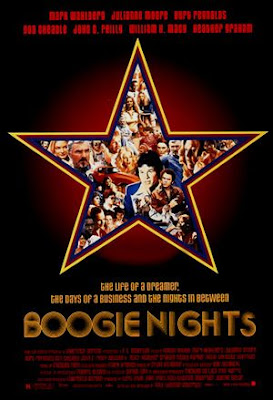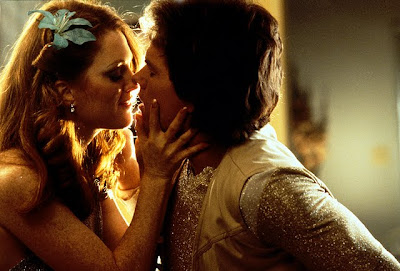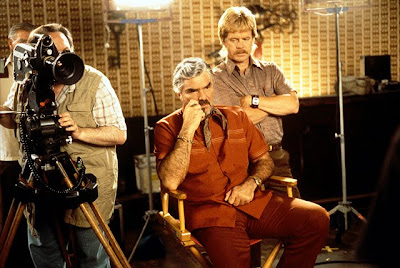Own Anderson's Nights on DVD & Blu-ray
More from Paul Thomas Anderson
Read our Reviews of Paul Thomas Anderson's
Magnolia
There Will Be Blood
Photo Slideshow
More from Paul Thomas Anderson
Read our Reviews of Paul Thomas Anderson's
Magnolia
There Will Be Blood
Photo Slideshow
Upon ruining take after take either with laughter or mentally going into the fetal position, an actor finally turns to look directly at the camera to tell the director, “I’m sorry, Paul. John freaks me out.”
The "John" in question would be none other than John C. Reilly who's been one of director Paul Thomas Anderson’s favorite people to cast from his first film Sydney a.k.a. Hard Eight through his more ambitious opuses like the title in question—Boogie Nights—and the even more freewheeling Altmanesque masterpiece Magnolia that followed.
Although Boogie disco-danced its way to shelves at Best Buy on Blu-ray back in December, the availability of both of Anderson’s acclaimed early works, which have graduated to high definition in stellar releases, has widened to nation-wide Blu bows.
And despite the fact that I’d seen the film twice before, in the most recent screening, I was struck by the amount of humor that Anderson managed to infuse throughout the work’s more overtly melancholic tone. For, obviously, during the first spin I was intoxicated, not only by Anderson’s passion for cinematographic movement, careful edits, and sweeping shot set-ups that swirl around a room and follow more than one point-of-view for several minutes but also the way he managed to avoid ‘70s film clichés by garnering humor from human behavior rather than the decade.
Yet while the humor to be found in its main Saturday Night Fever like John Holmes inspired lost boy, Eddie aka Dirk Diggler (Mark Wahlberg) is the easiest to grasp, Anderson is such an astute writer and creator of fully realized characters that it shines through everyone, especially the man so talented and versatile that he received his own “Case Files,” Mr. John C. Reilly.
Although we were obviously starting to see his range around the time that he broke our hearts singing “Mr. Cellophane” in Chicago, it wasn’t until he became Will Ferrell’s unexpected go-to man in Talladega Nights and Step Brothers that Hollywood saw the same potential apparent within just the first few clips contained in this extra feature.
Dedicated to the rambling, improvised, chameleon-like stylings of Reilly as he goes through the entire range of human emotion in a number of scenes from the film and a few that were deleted, Anderson’s inclusion of “The John C. Reilly Files” reminds us just why Paul was such a forward thinking and intuitive director that even with a marvelous cast of characters totaling over a dozen, he’s able to grasp their strengths, weaknesses, and what makes them the talented people they are right away.
And needless to say, Anderson’s love of human behavior and his ability to blend sociological analysis, cultural commentary with subject matter minutia and unpredictably offbeat visceral experiences that transport you into the film through the filter of not just his pen as a writer but the lens as a director is unparalleled, as evidenced throughout the entire Alfred Molina “Sister Christian”/”Jessie’s Girl” scene.
It’s rare for a filmmaker to make a film that more than one quote hungry critic calls a “masterpiece” and even doubly so for a director so young working on what is typically dubbed a “sophomore slump” for a good reason. Yet it’s far rarer for the same filmmaker to have had this exact same situation occur three times from nearly every major film critic and award show in the United States alone, let alone given the bonus of a Cannes directing award for Punch Drunk Love.
And while you can indeed see overlapping themes regarding father issues, makeshift families and the need to prove ones harshest adversaries or detractors wrong through work or the creation of a self-made endeavor in Boogie Nights, Magnolia and There Will Be Blood, overall the three masterpieces along with the two other excellent works all stand on their own as entirely unique entities.
Paul Thomas Anderson doesn’t make sequels, as he’s said before in interviews and he also doesn’t waste his energy making the same movie twice as his passion for the constantly moving camera and similar cast-mates aside, the look for each work from Oscar winning cinematographer Robert Elswit helps separate them even from a style perspective.
With three contemporary works and two just two period movies to his credit, this is quite a feat but Anderson is that rare caliber of filmmaker who knows the type of story he wants to tell, isn’t shy about his influences whether visually or structurally and then finds a way to approach his idea in ways we never expected.
Proof of this can be found when you hand someone Boogie Nights and as soon as they reach the sentence in the plot that discusses that the late ‘70s to early ‘80s era film centers on a large group of outsiders who become an unlikely family and whose “family business” happens to be adult filmmaking, chances are they’ll set the movie down without a second thought.
Yet, if they are daring film fans, as I encourage all to be in order to make up their own mind, I think their fears about what the movie would or would not contain and why we should care will be put to rest fairly soon so that Paul, John, or anyone else will ensure we don’t get freaked out.
Although it is either very loosely based on or at times heavily inspired by some of the tales surrounding the scene and its "stars" from the '70s, Anderson has made a film that matter-of-factly presents just what it is the characters do for a living and how unglamorous it is similar to the way that Francis Ford Coppola did with his film about a “family of mobsters.”
Essentially, just like if you watch The Godfather with the narrow view that it’s just a movie about the mafia or Anderson’s like it’s a movie about porn, you’re missing the truth behind the presentation. Namely, it's an unflinching look at families (real and/or just connected), the at-times monotony of the job, issues of loyalty verses greed and getting one’s priorities messed up by outside forces.
With a powerful cast of characters including some small but nonetheless effective roles played by cast-mates including Heather Graham, Don Cheadle, Nicole Ari Parker, Philip Seymour Hoffman, Thomas Jane, Melora Walters, William H. Macy, Philip Baker Hall, Reilly and others, in the end it’s the main three who battled against an awards season divided four ways between Boogie Nights, As Good as it Gets L.A. Confidential and of course, Titanic that most impress.
While Julianne Moore had always been one of my favorite charismatic actresses from her earliest work, to this day I still think that her role as the matriarch who makes newcomers her figurative “children” was more difficult than Kim Basinger’s excellent turn in Confidential. Similarly, nobody could touch Burt Reynolds in a role that could’ve honestly made or ruined the entire picture depending on how earnestly yet slightly manipulatively his adult filmmaker and patriarch was handled.
Yet, echoing the film’s character’s journey of course was recognition for Mark Wahlberg who made you regret any joke you made about his era as Marky Mark and the Funky Bunch with his dead-on performance as the heart that beats and breaks throughout the film in the form of a high school dropout who feels as though his only gift is below the waist.
Wanting to “be somebody” so badly that he forgets he is someone already from the beginning, Wahlberg serves two very important functions aside from his role as an actor in the film. He represents the flicker of new hope for his new family living vicariously through him and as a magnetized mirror that draws everything towards him but at the same time reflects what others want to see than what he really is as a person. It’s a beautiful piece of acting that we’d be reminded of once again in Wahlberg’s turns in The Departed and Invincible, which found the man who was Dirk making quite a comeback roughly ten years after Boogie.
Near the start of the review, I mentioned that I’d only seen Anderson’s film twice before and even though it’d been years since the last viewing, I was amazed by just how many scenes stuck with me including the devastating chronicle of Macy’s Little Bill in one of the film’s most cinematically impressive scenes and the fate of Don Cheadle’s “lost” character as well.
However, it’s because these memories had remained so firm in my mind that allowed me to sense the idea of another additional types of allegory in the film the third time since you’re able to process more information on different levels when you have the basics down. As noted, it’s as much about the industry as The Godfather is at hart about the mafia… yet in addition to being about a family and an era gone by, it’s also very clearly about filmmaking itself.
And whether the nature of film is depicted in either Reynolds’ character’s speeches against the convenience and low quality of filmmaking on video tape and how scripts wouldn’t even matter when money was at stake or simply in Anderson autobiographical wish to make a really good film, Boogie Nights succeeds on an infinite number of levels, which ensured its masterpiece status right out of the canister.
Text ©2010, Film Intuition, LLC; All Rights Reserved. http://www.filmintuition.com
Unauthorized Reproduction or Publication Elsewhere is Strictly Prohibited and in violation of the Digital Millennium Copyright Act.
FTC Disclosure: Per standard professional practice, I received a review copy of this title in order to evaluate it for my readers, which had no impact whatsoever on whether or not it received a favorable or unfavorable critique.





















